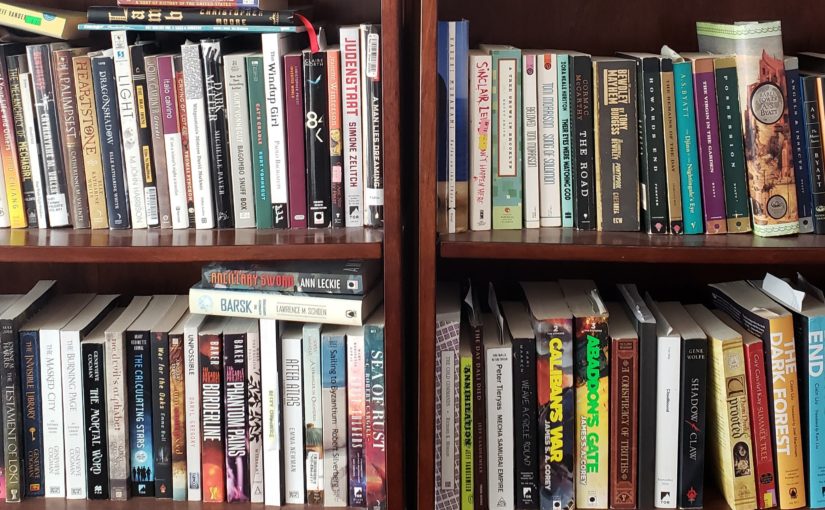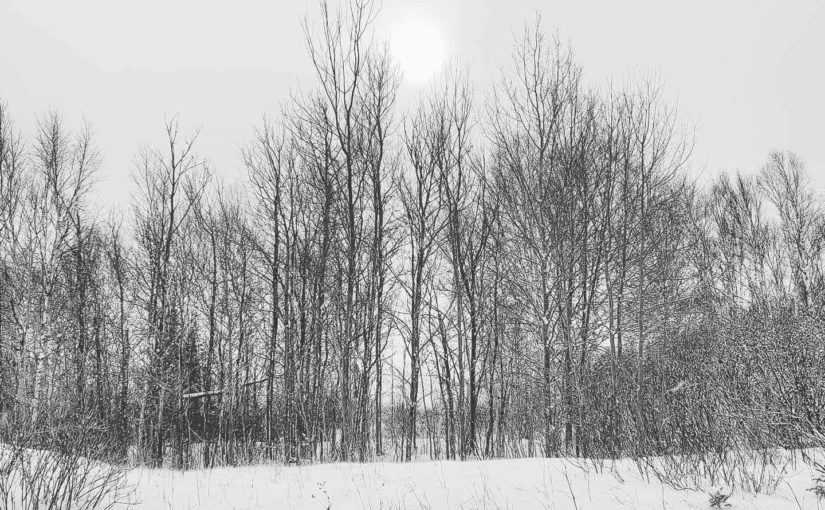I’ve historically done one of those “My Year in Reading” round-ups, and this year has been weirder than most. I read almost zero straight science fiction, precious little horror, and not much in the way of anything serious. Last Jan and Feb I was working my way through Robin McKinley’s catalogue. I made it through:
- Shadows — flawed but just ringing with her unique voice,
- Pegasus — pretty dull, but your inner horse girl will love it, and
- Dragonhaven — about a reserve for dragons in Utah or thereabouts, and a boy who was raised there. It ended up being one of my favorites of hers, and I don’t get all the negative reviews. Maybe it was the audio was so good; idk. I listened to this in the car, and my oldest (who is about the age of the protagonist) really liked it as well, fwiw.
I also tackled Peter S Beagle’s A Fine and Private Place, which that dude wrote at the tender and snot-nosed age of 19, jerk. It’s hella dated at this point, but in such an achingly nostalgic way: the invocation of 1950s Jewish neighborhoods in NYC is really affectionate. There are roughly 8 million literary allusions — such a young writer thing to do — and I found the whole project charming as hell. Also he kind of casually rips your heart out, as will become usual in his writing, jerk.
Then Covid basically ruined everything, and I was incapable of reading anything much more stressing than light fantasy or Regency romance for the foreseeable. I would have continued with McKinley, but the next book up was Deerskin, which is based on a folk tale that involves both sexual assault and incest, and therefore no. Being myself, I couldn’t switch gears, so I just ended the project.
Instead I read just about everything Julie Anne Long wrote — the Pennyroyal Green, Holt Sisters, and Palace of Rogues series …es — but excluding her contemporary romances because I basically hate small town romances, and that’s what those are. I tried to reread Marjorie M Liu’s Dirk & Steele series, but I forgot how stressful those can be, and only made it like 5 books in. (Stupid series name notwithstanding, those are some of the weirdest PNR/UF books out there, and I highly recommend them to folk who have tired of vampire detectives or werewolf academies or whatever.)
I also discovered T. Kingfisher (which is a pen name for Ursula Vernon) and read everything in the Clocktaur universe: Swordheart, Paladin’s Grace, Clockwork Boys, and The Wonder Engine. Those books are a delightful mix of macabre and cheerful, often utterly terrifying and hilarious at the same time. I was not able to undertake her newest horror outing, The Hollow Places, because the one before that, The Twisted Ones, kind of took a strip off me, and I don’t think I can handle that right now.
I picked up books 2 (or deeper) in fantasy series …es I had dropped off of for whatever reason, because finding comfort in the familiar was the name of the game.
- Stormsong by C.L. Polk, which is book 2 in the Kingston Cycle. The Kingston Cycle quite beautifully details what’s so horrific about hereditary magical systems. Stormsong wasn’t as compelling to me as the previous novel, but was a fun read anyway. Gaslamp fantasy in a Victorian England-ish world.
- The Mortal Word by Genevieve Cogman, book 5 in The Invisible Library series. This one really took me a while to hack through. I’m not sure why it failed to hold my attention, because there wasn’t anything wrong with it: similar to previous books, lots of murder, hijinks, and dragons. I think it’s because this is the book I realized I’m not enamored of Irene, and given how she’s the series protagonist, is kind of a problem. Another gaslamp fantasy in a multiverse.
- The Ippos King and Dragon Unleashed by Grace Draven, which are book 4 of the Wraith Kings series and book 2 of the Fallen Empire series. I was a little adrift with Ippos King because I read the previous novel, Eidolon, so long ago and kind of forgot everything about it. I do remember its protagonists, Anhuset and Serevek really well from Radiance, because that book is def a comfort read for me, and I’m sure I read it again this year. Dragon Unleashed I had to constantly ignore the premise because it didn’t make any sense to me, but the main characters were so likeable that wasn’t a hard task. Also, the heroine has a developmentally disabled mother, and she is written so beautifully, neither fetishizing nor infantilizing.
- Trapped by Kevin Hearne, book 5 of the Iron Druid Chronicles. These make very good books to listen to on road trips. Not much to say about this in comparison to other Iron Druid books: Atticus can be kind of a brick, but there’s always something happening, and his talking dog is the best. Contemporary UF with a druid protag and lots of American Gods-style shenanigans.
- A Touch of Stone & Snow by Milla Vane (which is another pen name for Meljean Brook), book 2 in A Gathering of Dragons series. This I was a little trepidatious to read: the previous novel, A Heart of Blood & Ashes, was pretty bloody and grim. ToS&S ended up being much less dire than HoB&A, though she’s still pretty adept at ripping your feels out. Barbarians in a world a generation past a brutal warlord crushing everyone.
I did start in on a couple fantasy series I hadn’t read before, just to include a little danger in my reading. Maybe it’ll get too dark and I’ll have to throw it over for rereading Radiance!
- Silver in the Wood by Emily Tesh. Charming amalgam of Victorian British folklore and folklorists. (Also, I just discovered this is the first in a duology, and now I know what I’m reading tonight.)
- Lord of the Last Heartbeat by May Peterson. Man, I was so enraptured with this when I read it, just perfectly Gothic as fuck and gloriously overwritten. Honestly, I don’t even know what was going on half the time, and I don’t even care. There’s like, tragic murderous ghosts of dead wives mooning about in diaphanous clothing, crumbling ancestral manses, and curses, so many curses. I started the next one, The Immortal City, and even though it’s similarly dreamy and emo, I don’t deal well with amnesia plots, and therefore haven’t finished it.
- The Charm of Magpies Series by KJ Charles. This one also touches on how gross hereditary magical systems can be, and is also often hella Gothic. There’s also a lot of sex in this series, but it’s actually awesome how directly related to the magical system it is. Anyway, gaslamp fantasy about a sorcerer policeman solving a murder, amongst other things.
- Binding Shadows and Death’s Dancer by Jasmine Silvera. Read these out of order — Binding Shadows in in the same universe as Death’s Dancer, but like 4 books later. Different series completely, so no big. Anyway, I just really loved these books, with their Prague locale and non-white protagonists who nonetheless have deep roots in Europe.
- Every Heart a Doorway and Down Among the Sticks and Bones by Seanan McGuire. Just, why didn’t I read this earlier? It’s a boarding school fantasy where are the children have gone to and returned from pocket universes, all different — everything from fairylands to underworlds. These kids all want to find their doors back, but they’re stuck in the real world trying to made do. Really great meta-fiction.
I did read just the tiniest amount of horror and science fiction, but way less than I usually do. A grab bag of various books:
- Rebecca by Daphne du Marier. I’d never read Rebecca, which seems like a pretty phenomenal oversight given my mild obsessions with the housewife in literature, Gothic novels, etc. At turns absolutely, howlingly funny and morbidly creepifying. The recent Netflix version was SO BAD; I had such a great time watching it.
- Battle of the Light Brigade by Kameron Hurley. Military sf that makes for a very good audio, with the added bonus of being completely anti-corporate. So much goes the other way.
- Devolution: A Firsthand Account of the Rainier Sasquatch Massacre by Max Brooks. Pretty stupid! I reread World War Z when the pandemic got going, and it ended up being oddly prescient about how people reacted to the pandemic both before and during the initial outbreak, down to the snake oil and the deniers. Devolution showcases all of Brooks’s strengths turned into weaknesses. WWZ made it clear he was a huge military history wonk, and he brings all of that to bear in Devolution in this junky evopsych way. His main first person voice is a housewife, which he cannot pull off at all convincingly. But! It’s also fast and bloody, and I appreciate his action sequences when he’s not lecturing me about Sun Tzu or whatever.
- Titus Groan by Mervyn Peake. My brother-in-law mailed the whole Gormenghast trilogy to me after a grudging hate-read through all eleventy million pages. It’s like he couldn’t understand why Gormenghast is so compelling, because it’s also 100% repellant. Everyone is a grotesque — everyone — if not downright evil. The plot, insofar as there is one, follows an ambitious servant climbing his way through the Groan family ranks, often bloodily. It is just delightfully fucked up, and I have never read anything like it.
- Hench by Natalie Zina Walschots. This might be my favorite thing I read last year? Certainly the one I kept talking about the longest. It’s got a premise not dissimilar from The Boys, but like, not as boy-centric, which maybe isn’t a huge surprise.
The trouble with never reviewing anything anymore is that this roundup is getting out of hand, and I’m sure there are another couple dozen books I read last year but just haven’t thought of them. Ah well.
So, not my finest year of reading, but then it’s not like it’s a competition or something, and there are no prizes for reading fancier or grittier fiction. I have been tentatively dipping my toes back into darker fiction — like I keep hacking at Nick Cutter’s The Deep even though it kind of makes me wig out every 20 pages and switch to something else. We’ll see.

